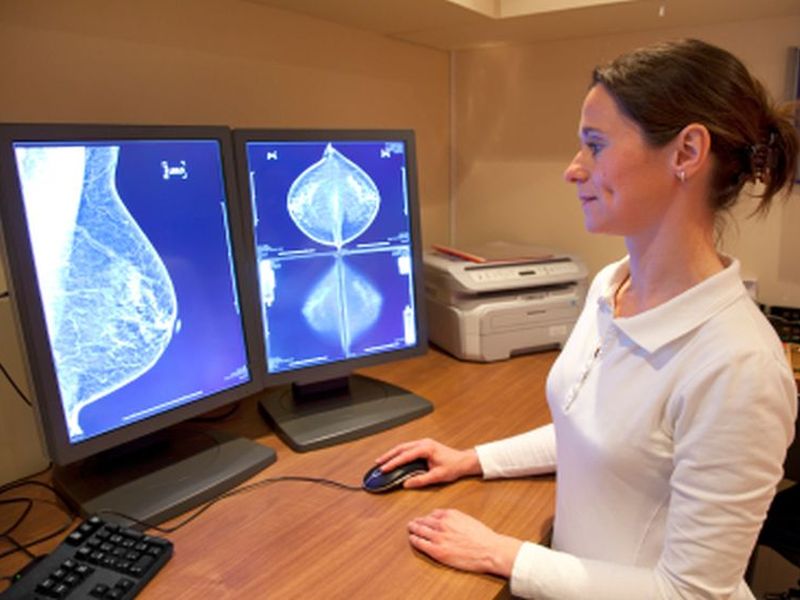Is AI a New Weapon in Breast Cancer Detection?
By Amy NortonHealthDay Reporter

TUESDAY, May 7, 2019 (HealthDay News) -- Artificial intelligence is the hot new trend in medicine, and now new research suggests it could help doctors better predict a woman's breast cancer risk.
The study is the latest to explore the potential role of artificial intelligence (AI) in medicine.
Typically, it works like this: Researchers develop an algorithm using "deep learning" -- where the computer system mimics the brain's neural networks. It's exposed to a large number of images -- tumor samples, for example -- and it teaches itself to recognize key features.
Studies so far have suggested that computers can outperform humans when it comes to diagnosing certain tumors. One found that an algorithm was better able to distinguish harmless moles from melanoma skin cancer, when stacked up against a group of dermatologists.
In the new study, researchers applied a variation of the same principle to breast cancer.
The ultimate hope is to be able to tailor breast cancer screening to individual women, said lead researcher Adam Yala, a Ph.D. candidate at the Massachusetts Institute of Technology.
"If you know a woman is at high risk, maybe she can be screened more frequently, or be screened using MRI," Yala explained.
As it stands, doctors already consider certain factors to get a sense of a woman's breast cancer risk. Family history matters, for example. Women with a mother or sister diagnosed with the disease, especially at a younger age, have a higher-than-average risk.
But the current risk-prediction "models" only go so far, Yala said.
To try to build a better model, his team exposed a deep-learning system to more than 70,000 digital mammography images from women who'd undergone screening at one medical center.
From there, the researchers developed two deep-learning models: One that used the mammography information alone, and a "hybrid" model that also included traditional factors, like age and family history, and a woman's breast density. (Women with dense breasts typically have a higher cancer risk than those whose breasts have more fat tissue.)
Yala's team tested the two models' accuracy against a standard tool that doctors use, called the Tyrer-Cuzick model. It estimates a woman's risk of developing breast cancer based on traditional risk factors and breast density.
For that test phase, the researchers used another 8,700-plus mammogram images. Just over 3% of those images had been followed by a breast cancer diagnosis within the next five years.
Overall, the study found, both deep-learning models were better than the standard approach in spotting women at high risk of developing breast cancer. But the hybrid version was most accurate.
It placed almost one-third of women who developed breast cancer into the top 10% risk category. In contrast, the standard model put 18% of those women into the top-10%.
The findings were published May 7 in the journal Radiology.
The study authors noted that the computer model worked just as well among black women as it did in white women, which is not the case with traditional models.
"That suggests we can move toward not only more accurate prediction, but more equitable prediction," Yala said.
But a researcher not involved in the study said the potential role of AI is far from clear at this point.
One issue is, no one knows what the computer is "seeing" in the mammogram that signals a higher risk, said Arkadiusz Sitek, who wrote an editorial published with the study.
"Imagine a physician who says to a patient, 'You're at very high risk for breast cancer. I don't know why, but the computer says so,'" said Sitek, a senior scientist at IBM Watson Health, in Cambridge, Mass. "That's a scenario that neither physician nor patient wants to be in."
Sitek said researchers need a clearer understanding of what's going on.
Beyond that, he said, further studies need to verify the computer model's accuracy -- using mammograms from women at additional medical centers.
And no, computers will not replace doctors any time soon.
In the foreseeable future, Sitek said, AI will serve as "a radiologist's assistant" -- helping to improve efficiency and watch out for "errors and inconsistencies."
More information
The U.S. National Cancer Institute has more on breast cancer risk.

The news stories provided in Health News and our Health-E News Newsletter are a service of the nationally syndicated HealthDay® news and information company. Stories refer to national trends and breaking health news, and are not necessarily indicative of or always supported by our facility and providers. This information is provided for informational and educational purposes only, and is not intended to be a substitute for medical advice, diagnosis, or treatment.

